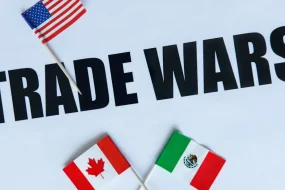
The political turmoil in France and Germany has raised significant concerns about the future of Europe’s economy. As the two largest economies in the eurozone. Their stability is crucial for the overall health of the European Union (EU). This blog explores the current political chaos in these countries and its potential impact on Europe’s economic landscape.
Political Instability in France and Germany
France’s Political Crisis
France is currently grappling with a political crisis following Prime Minister Michel Barnier’s resignation after a vote of no confidence. This has left President Emmanuel Macron in a challenging position. As he must appoint a new prime minister who will likely lack a parliamentary majority. With elections not scheduled until at least June 2025, the French government faces significant paralysis in addressing pressing economic issues. Which includes a budget deficit of 6.2% of GDP, the highest in the eurozone.

Germany’s Coalition Collapse
Germany is also experiencing political upheaval, with Chancellor Olaf Scholz’s coalition government fracturing in November 2024. This has led to an early election scheduled for February 2025. The instability has stalled critical discussions on fiscal policy and economic reforms. This left Germany’s economy, which is projected to shrink by 0.1% in 2024, in a precarious position.

Economic Consequences of Political Chaos
Sluggish Economic Growth
Both France and Germany are facing sluggish economic growth, which poses a risk to the broader European economy. France is expected to grow by only 1.1% in 2024, while Germany’s economy is projected to contract for the second consecutive year. This stagnation is compounded by challenges such as high energy prices, a shortage of skilled labour, and excessive bureaucracy.
Impact on European Competitiveness
The political vacuum created by the instability in these two nations threatens to undermine Europe’s competitiveness on the global stage. With the U.S. and China continuing to outpace Europe in economic growth and innovation, the lack of decisive action from France and Germany could further weaken the EU’s position in international markets.
Addressing Defense and Trade Issues
The ongoing political crises also hinder Europe’s ability to respond effectively to external pressures, such as U.S. tariffs and the need for increased defence spending in light of geopolitical tensions. The EU is facing potential trade conflicts with the incoming U.S. administration, which could impose tariffs on European goods, exacerbating the continent’s economic challenges.
The Future of Europe’s Economy
Need for Franco-German Cooperation
Historically, the Franco-German axis has been a driving force behind European integration and economic policy. However, the current political instability in both countries has created a vacuum that hampers progress on critical issues such as common borrowing, public investment, and industrial policy. Without strong leadership from France and Germany, it is unclear how the EU can effectively address its economic challenges.
Potential Shifts in Economic Power
As France and Germany struggle with internal issues, other EU countries like the Netherlands and Spain, which are performing relatively well, may gain more influence within the bloc. This shift could lead to a reconfiguration of power dynamics in Europe, potentially sidelining the traditional leadership roles of Paris and Berlin.
The political chaos in France and Germany poses significant risks to Europe’s economic stability and growth. As these two nations grapple with internal challenges, the EU must navigate a complex landscape of sluggish growth, competitiveness issues, and external pressures. The future of Europe’s economy may depend on the ability of its largest member states to regain stability and provide the leadership necessary for collective progress.
Read more on Lifetips.blog












